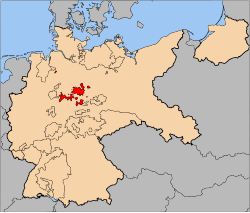Free State of Brunswick
| Free State of Brunswick Freistaat Braunschweig (German) |
||||||
| State of Germany | ||||||
|
||||||
|
||||||
| Brunswick within Germany | ||||||
| Capital | Brunswick (Braunschweig) | |||||
| Government | Republic | |||||
| Council Chairman | ||||||
| • | 1918–1919 | Sepp Oerter | ||||
| • | 1919–1920 | Heinrich Jasper | ||||
| Minister-President | ||||||
| • | 1919–1920 (first) | Heinrich Jasper | ||||
| • | 1946 (last) | Alfred Kubel | ||||
| Legislature | Landtag | |||||
| Historical era | Interwar period | |||||
| • | Established | 10 November 1918 | ||||
| • | Abolition de facto | 14 October 1933 | ||||
| • | Disestablished | 23 November 1946 | ||||
The Free State of Brunswick (German: Freistaat Braunschweig) was a state of the German Reich in the time of the Weimar Republic. It was formed after the abolition of the Duchy of Brunswick in the course of the German Revolution of 1918–19. Its capital was Braunschweig (Brunswick).
The Duchy of Brunswick had been established after the 1814 Congress of Vienna, as a sovereign successor state of the German Confederation. It roughly comprised the incoherent territory of the former Principality of Brunswick-Wolfenbüttel, stretching from Holzminden on the Weser River in the west to Blankenburg in the Harz mountain range and Calvörde in the east.
The Brunswick territory was largely surrounded by the Prussian provinces of Hanover (the former Kingdom of Hanover) and Saxony. From 1913 it was ruled by Duke Ernest Augustus of the House of Hanover.
The reports on the Kiel mutiny of 3 November 1918 sparked unrest in Braunschweig, when local revolutionaries led by the Independent Social Democratic Party of Germany (USPD) stormed the local prison, occupied the railway station and the police headquarters, and also attacked Brunswick Palace. On November 8, Duke Ernest Augustus of Brunswick was forced to resign and went into exile. Two days later, a worker's council proclaimed the "Socialist Republic of Brunswick", ruled by a council of USPD revolutionaries.
...
Wikipedia



